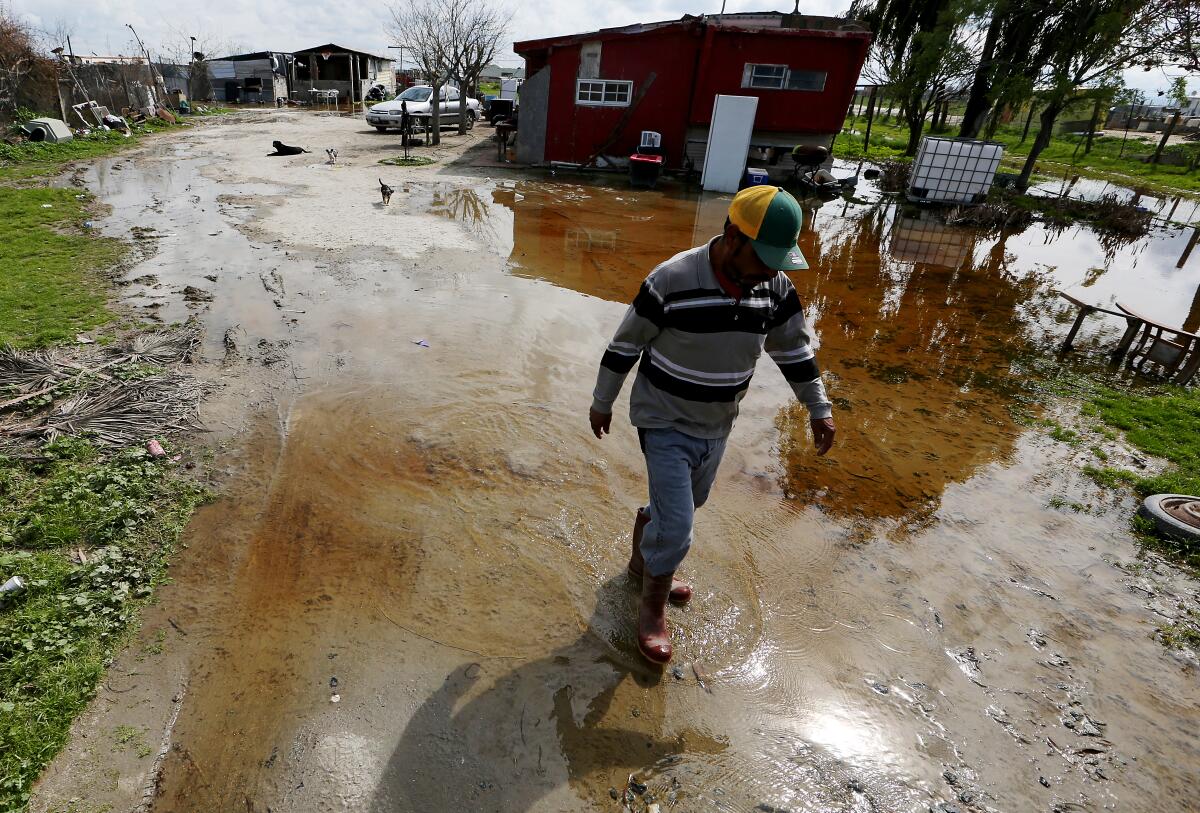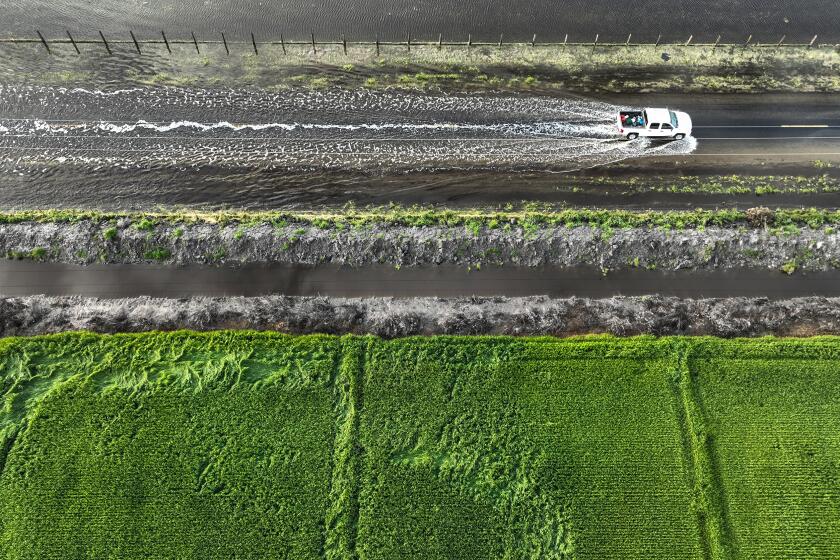Epic rains expected to take one more swat at California, with masses of mosquitoes

- Share via
After a parade of storms battered the state, Californians are enjoying an extended stretch of sunshine and warmer temperatures.
But the return of pleasant weather this year could bring more than suntans as the deluges provided fertile ground for mosquitoes.
“More water means more mosquitoes,” said Joel Buettner, general manager of the Placer Mosquito & Vector Control District in Northern California.
Although the storms provided much-needed moisture to parched hillsides and reservoirs, they also left standing water — and mosquitoes thrive in the still water commonly found in backyards, such as in buckets and disused swimming pools.
“One of the big ones for us, in terms of mosquito production, are these unmaintained swimming pools,” said Steve Vetrone, director of scientific-technical services for the Greater Los Angeles County Vector Control District.
In usually rain-starved Southern California, unused pools remain dry or pumped out, or collect just small amounts of rainwater that evaporate in the next heat wave.
“But now with the rain, those pools have collected a significant amount of water,” Vetrone said, “and those are the sources that are going to be quite problematic for us in terms of getting a handle on mosquito control.”
L.A. County vector control scouts for unmaintained pools using multiple methods, including aerial and satellite photography and law enforcement aircraft, to find and identify pools that have become stagnant.
“We’re aware of a lot of them,” Vetrone said. “But obviously these pools tend to go out of commission without us knowing all the time.”
While temperatures are expected to hit the 80s in the Central Valley in the coming days, the most significant threat of snowmelt is still weeks away.
“So we rely on folks calling us that there’s a mosquito issue,” he said, “and then ... our technicians will go out and do a treatment if necessary.”
The prevalence of invasive species of mosquitoes could also cause issues as the weather warms up.
The species aedes aegypti, which is more likely to spread viruses Zika and dengue, and aedes albopictus, which feeds on animals as well as humans, are “very much container breeders,” Vetrone said.
The mosquitoes’ eggs can survive a couple of years in the correct dry conditions, and now the rains have provided perfect conditions for the eggs to hatch.
“We may see, as a result of all this rain, higher populations of those invasive species as well,” Vetrone said.
But in some ways, he said, the rains may have helped control the mosquito population in the Southern California region in general, and in the Los Angeles Basin in particular.
The basin’s underground storm drains, often stagnant, filled with debris and fed by irrigation, are “significant contributors” to the above-ground mosquito population, Vetrone said.
But the storms washed out the drains, leaving them cool and clear.
It will not be long, however, until vector control workers in Southern California find out how bad this year’s mosquito season will be.
The Greater Los Angeles Vector Control District has already begun trapping mosquitoes, Vetrone said. So far, the numbers are low, but signs are pointing to an increase in the mosquito population.
“With each trapping, we’re seeing, slowly, these numbers start to rise,” he said.
Norovirus, sometimes referred to as stomach flu, is growing in California and has forced the closure of at least one school.
“We’ve had the luxury of having a couple of 70-plus-degree days here recently,” Vetrone said. “We put a few more of those together, we could start seeing a lot of mosquitoes starting to lay eggs.”
Northern California, specifically Placer County between Sacramento and Lake Tahoe, is a little behind the Los Angeles region in terms of its mosquito season, but Buettner is keeping his eye on the standing water in his region.
“If we don’t see any more rain for the rest of the spring and summer,” he said, “things probably will get back to normal.”
Agricultural “fields will dry up, rice fields will remain rice fields, and all the ditches and little puddles and everything that are everywhere right now are going to dry up,” he said.
But the region could see an issue if snowmelt from the record-breaking snowpack overwhelms reservoirs and dams and spillways, causing water to pool in normally dry areas.
“That would be really bad,” Buettner said. “In the summertime, lots of water means mosquitoes.”
Although the mosquito populations may explode, neither Buettner nor Vetrone expect California to see a surge in cases of West Nile virus.
West Nile transmission, Vetrone said, has less to do with mosquitoes and more to do with birds. As the Centers for Disease Control and Prevention explains, mosquitoes become infected with West Nile by feeding on infected birds and then infect humans by biting them. A better barometer for predicting human transmission is the immune status of the bird population, Vetrone said.
“It’s our experience that drought years tend to maybe have a little bit more West Nile activity,” Buettner said, “because when there’s limited water, the birds and the mosquitoes and the people all kind of congregate around those scarcer water sources, and you get more transmission.”
With water sources plentiful, “perhaps West Nile will be a little bit lower,” Buettner said.
In Los Angeles County last year, 64 people were infected with West Nile, with no deaths reported.
Still, Buettner and Vetrone urged people to be proactive as the sun starts shining.
“This is the time when folks should get out into their yards, deal with their swimming pools, get them cleaned out,” Buettner said.
Residents should take care of other sources of standing water too. Vetrone suggested that containers not only be dumped out but also scrubbed to dislodge any eggs.
And bug spray is always helpful.
“Wearing mosquito repellent and possibly long pants will be uncomfortable,” Vetrone said, “but if it means not being bitten, then we’ll be better off for it.”
More to Read
Sign up for Essential California
The most important California stories and recommendations in your inbox every morning.
You may occasionally receive promotional content from the Los Angeles Times.











